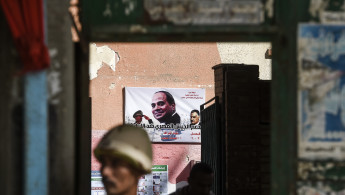Sisi grants complete impunity to military top brass in new edict: reports
Egyptian military sources revealed on Saturday that President Abdelfattah al-Sisi has published an edict providing immunity and unprecedented privileges to army officers, going against the Egyptian constitution, according to reports.
Online news outlet Arabi21 gained a copy of the announcement, which was circulated to all state institutions and agencies and contained orders detailing how to work with army officers and their families.
“The defence ministry is the sovereign body of the country, and its officers enjoy immunity which prevents any civilian body from interference in their activities,” the document said.
“Anyone who challenges this immunity will be placed under immediate inspection and could face military prison - whether from within the civilian police, intelligence agencies or otherwise.”
“This does not mean that anyone is above the law, rather that military officials will be ruled by their own military courts and judges,” read the edict, defending the new rules.
Human rights organisations have long argued that the Egyptian military systemically perpetrate human rights abuses, employ arbitrary detention and act with impunity in their repression of independent voices in Egypt.
Anonymous sources within the military believe that the Egyptian president is seeking to shore up support within his political power base as Egyptians become increasingly unsatisfied with his rule.
Army officers untouchable
“Military institutions are not subject to laws pertaining to any state of emergency which may affect the country, whereas a state of emergency allows the military to detain any individual, including judges, intelligence officials, politicians and others," said the surprise announcement.
“Intelligence agencies and civilian police may not interfere with military individuals or activities in any way, their role is rather to facilitate the wishes of such individuals. There is no recourse to challenge this decision.”
The edict continues: "no civil institution is allowed to question or inspect a military individual’s property or ownership, and the bombastic letter repeatedly threatens civilians officials against inspecting the cars, of military officials, their property or ownership."
There are, apparently, exceptions to this rule. The two instances in which civilian authorities may intervene are in cases of murder or implications with the drug trade. But even in these rare cases, high-ranking members of the army cannot be arrested while investigations may be made. Information must then be passed to the military in such cases.
Sisi's carrot and stick
The unnamed military sources who leaked the document said “Sisi has been using the carrot and stick to quell disquiet within the ranks of the army, and make sure that he remains in favour of the generals.”
“Sisi has no real popular backing - and so he considers the army his political power base, and his backing. Therefore he feels he has to offer unprecedented privileges and powers that haven’t been seen before in the history of the military establishment," they continued.
According to the source, alongside the ‘carrot’ of immunity, Sisi is using the ‘stick’ to purge the army of any opponents to his rule. “The message is: be with me and you will have everything. Anyone who tries to oppose or confront me, I will crush him.”
In July 2020, President Sisi made alterations to the law to ban any other army officials from running for elected office without military approval, a move that many consider an attempt to squash any potential challengers to his rule from within the army’s ranks.
“These unprecedented privileges and immunity are making many officers circle around Sisi, and refuse the idea of any democratic change. In any democratic country, these privileges would certainly be taken away - and they certainly go against the Egyptian constitution.
Article 53 of the Egyptian constitution states that “all citizens are equal under the rights, freedom and responsibilities endowed by the law, without privilege and without discrimination due to religion, belief, gender, origin, ethnicity, colour, language, ability, social position, political position, or on any other basis.”
“Discrimination and incitement to hatred are crimes, punishable under the law. It is the responsibility of the judiciary to take appropriate action against any form of privilege or discrimination,” the article concludes.





 Follow the Middle East's top stories in English at The New Arab on Google News
Follow the Middle East's top stories in English at The New Arab on Google News


